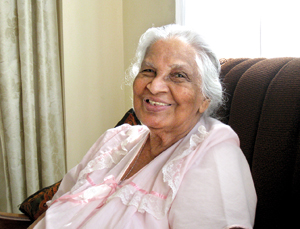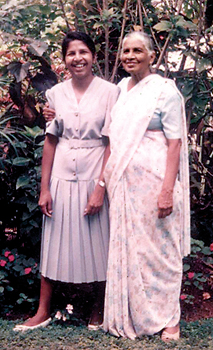Taking care of our ‘Mother Baby’
Mother gets up in the morning, washes and dresses herself, checks her handbag and announces “I’m going to the Convent”. We laugh sympathetically and call her, “Dear Mother Baby” and settle her down.
She can’t go anywhere.
She has Alzheimer’s Disease, and my sister Charmaine and I are her care givers.Mother is 91 years old. She can still remember that she was born on the 27th of May in 1921, but there’s little else she can remember now.

Living with Alzheimer's at 91, in her own world yet surrounded by love
She was an only child who lost her father in early childhood, and so, was totally dependent on her mother. As a child she was in a convent boarding where the nuns had been very kind to her, but sleeping away from her mother resulted in frequent nightmares which persist even now.
She had a happy marriage and raised four children, but had more than her fair share of children’s illnesses, as I was struck down by polio at the age of three. I can now imagine what she and my father would have undergone at the time, with sleepless nights caring for me. In other words – she was my care giver. But she took it all in her stride and was a tower of strength.
She had a bubbly personality and made many friends, especially with those much younger to her – maybe they suited her personality more than the staid people of her own age. She was beautiful, elegant and stylish and loved to dress well. She was a delightful mixture of exuberance, impulsiveness, imperiousness, perceptiveness, generosity, optimism, tragedy – the list is endless.
She loved being centre stage, and Charmaine and I used to call her our “Drama Queen”! She could change over from bubbly to tragedy in a moment and we sometimes called her our “Tragedy Queen”!
Alzheimer’s Disease crept in so insidiously and seemed as if it was just a quirk of her dramatic personality, that looking back, we cannot pinpoint when the first symptoms appeared – maybe it was when she was in her late sixties or early seventies.
The first indication of its onset was that she kept on asking the same question repeatedly. She had always been forgetful, so of course, we didn’t worry too much. A little anecdote from the past about her forgetfulness – once when she was going marketing she picked up the broom instead of the umbrella (they were placed close together) and nearly walked out of the house carrying the broom. She was stopped just in time by Father!
Loss of memory for recent events was her next symptom. She couldn’t remember who had visited yesterday nor could she remember messages that she had undertaken to convey. Other problems came up then. She would pick quarrels for no apparent reason and would walk out in a huff. Sometimes, without a quarrel and without letting anyone know, she would walk out. This was at a time when hardly anyone had a phone, so poor Charmaine had to go from place to place looking for her. It was indeed a stressful time for us.
Then came extreme mood swings. When we returned home after work it was anybody’s guess as to what her mood would be, and it could dramatically and unpredictably change from happy to depressed in a moment. Once I remember she was in a good mood when I came home at 6 p.m., but by 7 p.m, her mood had changed. Our domestic at the time was a girl whom Mother was very fond of, and Mother flew off the handle suddenly, insisting that the girl was hungry and that we should all have dinner right then instead of our usual time of 8.30 p.m. When told that we weren’t hungry, she flew into a rage and smashed plates, creating chaos. A few months later, for no apparent reason, she turned against this very same helper and insisted that she be sent home. This was very uncharacteristic of Mother as she was always very kind to our domestics – so much so that one of them stayed for over 50 years with us.
It was when she was about 80 years old that she became verbally abusive, and this would go on through the night till about 3 a.m, depriving us of sleep. One of her accusations when abusing us was that we had taken all her sarees and given them away to our friends. Another was that we did not give her anything to eat. Friends in similar situations have told me that this was a frequent accusation and it was quite embarrassing when such accusations were made in the presence of visitors! Fortunately for us, even in her confusion, my mother’s innate graciousness as a hostess came through in the presence of visitors.
Confusion was another sign of her deterioration. She didn’t know where she lived and kept on wanting to go to the convent. This turned into a heart rending crying for her children who, according to her, were in a convent boarding waiting for her to come and take them home. The image probably stemmed from her own past when she waited in the convent boarding for her mother. When we remind her that her children are old now and not in boarding school, her reply is “I’m not talking about you – I mean my small children, the other generation” and nothing we say can convince her otherwise.
Then came the day she had a bad fall and sustained a head injury. She was taken to hospital where a CT scan showed no abnormality, and so we brought her home. But now came the most distressing symptom of all – hallucinations. “There! Look at all those children running up and down the stairs!” she would point out leaning forward to reach for the children she could see in her mind. Or she would say “How can I sleep here?
There’s water all flowing down the walls onto my bed!” That day she couldn’t even recognize us and kept pleading with us, her daughters, crying “Please let me go home! My two daughters must be wondering what on earth has happened to me!” All our efforts to convince her that we were her daughters were pointless, till memory suddenly returned. The next morning the psychiatrist put her on medication that cleared up the hallucinations, but the memory of that night still haunts me.
Her repeated questioning has increased in frequency, and now the same question is asked every two to three minutes. At first we were impatient as it was impossible to concentrate on anything while with her, but once we realized it was the onset of Alzheimer’s Disease, we learned to be patient.
She has now lost her memory almost totally, and has regressed to her early childhood. She plaintively cries “Mamma!” forgetting that her mother is long gone. She refuses food that she doesn’t like and like a child, we have to bribe her with ice cream. Love of clothes is still very much a part of her and her eternal complaint is – “I have nothing to wear!” When she says this we heap all her clothes on her lap, which delights her. She is sometimes scared to go to bed alone, and at such times I get into bed with her and rock her to sleep singing lullabies. She screws up her eyes pretending to sleep and then furtively opens one eye to see whether I am watching her!
She has lost interest in most things, and even the TV doesn’t appeal to her nowadays as her attention span is limited, but recently she became quite animated over James Bond films – we weren’t sure whether it was the action or Sean Connery that interested her!
It hasn’t been easy looking after her, so how do we cope?
First of all, she needs 24 hour care. We are lucky that there are three of us (including one of her favourite domestics) to share the problems, but the brunt of the caring falls on Charmaine as I cannot help her much due to my disability. Mother hates to bathe now and it takes our combined effort to give her a bath.

With daughter Charmaine in her late sixties
I coax her to the bathroom while Charmaine does the rest. Although she screams like a child, once her bath is over she is full of gratitude to us for our care. Like a baby she smells sweetly of soap and powder and with her silver hair framing her face she is still beautiful. My heart overflows with love and I cuddle her and smell her hair. In all her confusion, our love is the one thing that always gets across to her. We call her our “Mother Baby”; and pinch her cheeks and cuddle her, and she just loves this.
Regression into childhood is a long process. Unlike actual children who grow up quickly, this childhood goes on for a long time, so be prepared.
“Going to the convent” is still one feature of her confusion, and not knowing whether it’s day or night she tries to walk out in the middle of the night, so eternal vigilance is a must. The doors are locked and keys taken out. Our sleep is interrupted nearly every night and we snatch a few hours of sleep whenever we can.
In caring for someone with Alzheimer’s Disease, patience is one virtue that is a must. When the same question is asked interminably, patience does wear thin, but as a doctor I think of her as a patient – and one doesn’t lose one’s temper with a patient. Charmaine being a teacher thinks of her as a pupil. Patience was most needed at the time when she was aggressive and abusive, but thankfully and hopefully that’s behind us now.
The technical term for us is “care givers” but I don’t consider us just care givers. We are daughters – and there’s a wealth of difference in meaning between these two words.
comments powered by Disqus


























